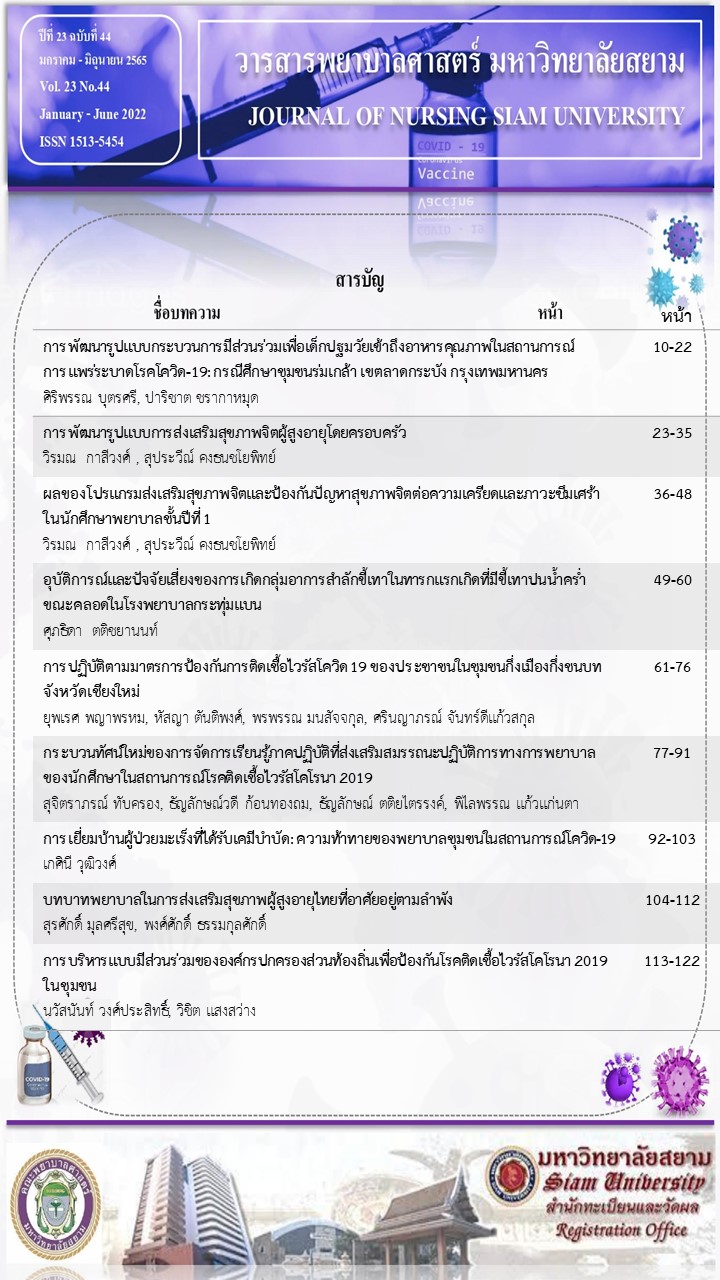Development of a mental health promotion model for the older people by family
Keywords:
Mental health promotion, Model of mental health promotion for the older people, older people, familyAbstract
Objective: To study 1) the basic information on the mental health promotion for the older people by families, and 2) to develop the Mental Health Promotion Model for the older people by Families (MHPMOF model). 3) to test the effect of the MHPMOF model.
Method and study design: The Research and Development had 3 phases. In phase 1, a qualitative study of basic information on mental health promotion of the older people used the data to develop the MHPMOF model in phase 2 and tested the developed model in phase 3. The study in phase 1 had 2 groups of key informants such as community leaders, caregivers, health workers of 8 persons, and the elderly 8 persons. Phase 2, developing the MHPMOF model used key informants such as community leaders, the elderly, family members, of the elderly, and community health volunteers of 21 persons. Phase3, to develop the MHPMOF model using a quasi-experimental study, the sample was the elderly aged over 60 years including good communication, willing to participate, and had a family caregiver who care for the elderly as 18 persons. Data collecting used elderly mental health assessment (T-GMHA-15). Data were analyzed by paired t-test.
Results: The study revealed that the problems and causes of mental health in the elderly's perspective were the elderly having more burdens such as family expenses, debts, and caring for children. There were problems with family communication, chatting with misunderstandings. Four steps in the MHPMOF model were step 1 strengthening family knowledge and understanding. step 2 strengthening family relationships, step 3 empowering and encouragement for the elderly, and step 4 caring for the elderly with love and care. The results of the experiment were the mean mental health scores of the elderly before and after the experiment with difference statistically significant (p < 0.05).The mean score before the experiment was 38.50 (S.D. = 8.35) and after the experiment was 54.11 (S.D. = 6.51), t = 8.166.
Conclusion: According to research findings, family is important to the mental health of the elderly, the family should take care of the elderly for having no more burden, well communication with understanding. Because the family is a social institution that is close to the elderly.
References
เกรียงศักดิ์ ธรรมอภิพล, จุฑาธิป ศีลบุตร, จิราพร ชนพิกุล, กวินารัตน์ สุทธิสุคนธ์ และสมชาย วิริภิรมย์กุล (2559) ปัจจัยที่ส่งผลต่อความยากลำบากของครอบครัวผู้สูงอายุไทย.วารสารวิจัยระบบสาธารณสุข,ปีที่10(4), 140-426.
กิตติวงค์ สำสวด. (2560).ปัจจัยที่ส่งผลต่อคุณภาพชีวิตผู้สูงอายุในจังหวัดภาคตะวันออก. วารสารชุมชนวิจัย, ปีที่11 (2 ), 21-37.
กรมสุขภาพจิต กระทรวงสาธารณสุข.(2560). แนวทางการดำเนินงานส่งเสริมสุขภาพจิตและป้องกันปัญหาสุขภาพจิตในผู้สูงอายุ. กรุงเทพฯ: โรงพิมพ์สำนักงานส่งเสริมพระพุทธศาสนาแห่งชาติ.
ขวัญสุดา บุญทศ และขนิษฐา นันทบุตร. (2560). ความสุข ความทุกข์ และสุขภาพจิตผู้สูงอายุ ในชุมชนแห่งหนึ่งในภาคเหนือตอนบน ประเทศไทย. วารสารสมาคมจิตแพทย์แห่งประเทศไทย, ปีที่62(3), 257-270.
ยชญ์รวินทร์ จรบุรมย์ และสิริกร สุธวัชณัฐ. (2563). ปัจจัยที่สัมพันธ์กับภาวะสุขภาพจิตของผู้สูงอายุในครอบครัวข้ามรุ่น.วารสารพยาบาล, ปีที่69(3), 20-26.
ชูศรี วงศ์รัตนะ. (2560). เทคนิคการใช้สถิติเพื่อการวิจัย (ฉบับปรับปรุง) พิมพ์ครั้งที่ 13. กรุงเทพฯ : ศูนย์หนังสือจุฬาลงกรณ์มหาวิทยาลัย.
ชุติมา มาลัย, รุ่งทิพย์ ไชยโยยิ่งยงค์, เพ็ญนภา แดงด้อมยุทธ์และศรีสกุล เฉียบแหลม. (2562). ปัจจัยที่มีความสัมพันธ์ต่อภาวะซึมเศร้าของผู้สูงอายุในชุมชน จังหวัดราชบุรี. วารสารพยาบาลสงขลานครินทร์,ปีที่39(3), 67-76.
ณัฐิกา ราชบุตร, จุลจีรา จันทะมุงคุณ และจารุภา แซ่ฮ่อ.(2560). การศึกษาโปรแกรมส่งเสริมสุขภาพจิตและป้องกันโรคซึมเศร้าเชิงสังคมและวัฒนธรรมในผู้สูงอายุตำบลดอนมนต์ อำเภอสตึก จังหวัดบุรีรัมย์. วารสารมฉก.วิชาการ, ปีที่20(40),115-125.
รัถยานภิศ พละศึก และเบญจวรรณ ถนอมชยธวัช.(2560 ). ตัวแบบของครอบครัวในการดูแลผู้สูงอายุ.วารสารเครือข่าย วิทยาลัยพยาบาลและการสาธารณสุขภาคใต้, ปีที่ 4 (3), 135 -150.
มาติกา รัตนะ. (2559). ความชุกและปัจจัยที่มีสัมพันธ์กับภาวะซึมเศร้าในผู้สูงอายุจังหวัด. รายงานการค้นคว้าอิสระของการศึกษาตามหลักสูตรสาธารณสุขศาสตรมหาบัณฑิตวิชาเอกการจัดการการบริการสาธารณสุข. คณะสาธารณสุขศาสตร์: มหาวิทยาลัยธรรมศาสตร์
วิรมณ กาสีวงศ์, สุประวีณ์ คงธนชโยพิทย์, สุรเชษฎร์ สมตัว และ เพ็ญประภา พลหาราช. (2558). ภาวะซึมเศร้าผู้สูงอายุในชุมชน. รายงานการวิจัย : มหาวิทยาลัยนครพนม.
โสภาวรรณ เชื้อดี, ชาตรี ประชาพิพฒน์ และสาโรจน์ เพชรมณี. (2559). ผลของการใช้แรงสนับสนุนทางสังคมและการเสริมสร้างคุณค่าในตนเองต่อสุขภาพจิตผู้สูงอายุ ตำบลพังกาญจน์ อำเภอพนม จังหวัดสุราษฎร์ธานี. วารสารการพัฒนาสุขภาพชุมชน มหาวิทยาลัยขอนแก่น, ปีที่4 (1), 67-82.
สุชาดา แซ่ลิ่ม. (2562). การศึกษาความชุกและปัจจัยที่มีผลต่อภาวะซึมเศร้าของผู้สูงอายุในอำเภอเมือง จังหวัดระนอง. วารสารวิชาการแพทย์,ปีที่33(1), 193-202.
Branson, J., Branson, A., Pozniak, K., Tookes, J. and Schmidt, A.(2019). The Role of Family During Older Adults’ Living Transitions: Implications for Helping Professionals and Family Counselor. The Family Journal, 27(1) 75-83
Suwanmanee S, Nanthamongkolchai S, Munsawaengsub C, Taechaboonsermsak P. (2012). Factors influencing the mental health of the elderly in Songkhla, Thailand. J Med Assoc, 9(6),S8-15. PMID: 23130483.
World health organization. (2017). Mental Health of older adult. retrieved 29 sep 2021 from http://www. who.int/news-room/fact- sheets/detail/mental-health-of-older- adults .retrived 29 sep. 2021.
World health organization. (2021). Ageing and Health. retrived 30 novem. 2021 from https://www.who.int/news-room/fact sheets/detail/ageing-and-health.
Downloads
Published
How to Cite
Issue
Section
License
Copyright (c) 2022 Journal of Nursing, Siam University

This work is licensed under a Creative Commons Attribution-NonCommercial-NoDerivatives 4.0 International License.
Content and information published in the Journal of Nursing, Siam University is the comment and responsibility of the authors.
Articles, information, images, etc. published in the Journal of Nursing. Siam University is the copyright of the Journal of Nursing, Siam University. If any person or entity wants to take all or part of it for publication for any purposes, please reference the Journal of Nursing, Siam University.



